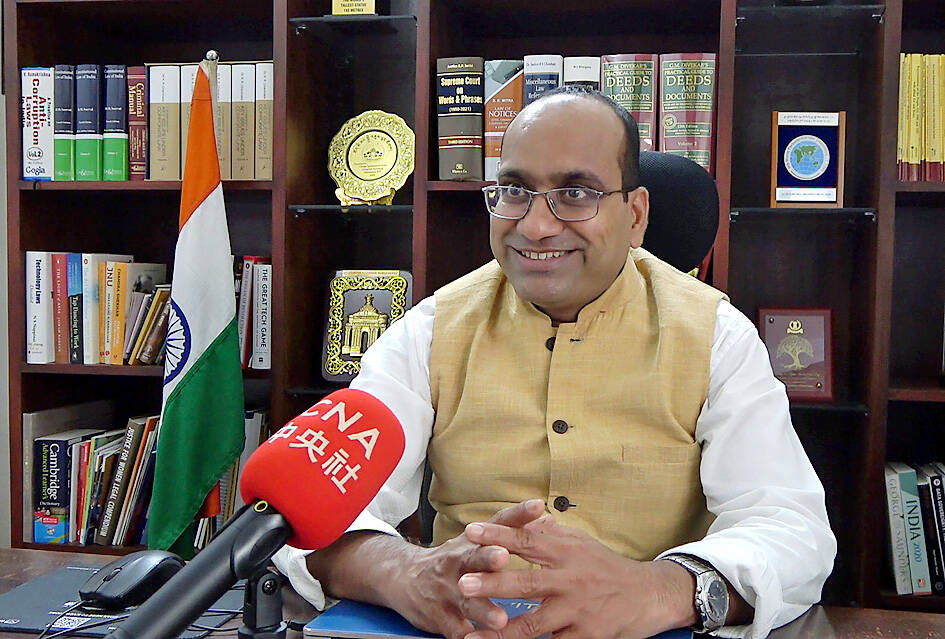Indian lawmaker Sujeet Kumar said he believes New Delhi should step up its political engagement with Taiwan, including through mutual visits by parliamentary delegations, to counter China’s “bullying” behavior.
Kumar, a member of the Biju Janata Dal party representing the eastern state of Odisha in the Rajya Sabha, India’s upper house of parliament, arrived in Taiwan on Sunday for a 10-day visit.
He is scheduled to deliver a speech at the Yushan Forum, meet with President Tsai Ing-wen (蔡英文) and Minister of Foreign Affairs Joseph Wu (吳釗燮), and visit several think tanks, business groups and universities.

Photo: CNA
In a media interview before leaving India for Taiwan, Kumar said he believes there is “immense potential” for developing Taiwan-India relations in the areas of trade, investment and tourism, as well as through educational and political exchanges.
“I think it’s necessary that the two countries come together, because we are both proud democracies. India is the largest democracy in the world, and Taiwan, [while] being a small nation, is a successful democracy,” he said.
He said that he plans to use the visit to explore the possibility of a free-trade agreement with Taiwan.
“In India, we are really hopeful that the Taiwanese semiconductor industry will look at India as a destination,” particularly as countries try to diversify their supply chains away from China, Kumar said.
Meanwhile, Taiwanese can learn from India’s successful service industry, and should also consider visiting the country as tourists, given its status as “the cradle of Buddhism,” he said.
In addition to building social and economic ties, Taiwan and India need to become closer politically, as both have relationships with China in which Beijing acts as “the aggressor,” whether it be in the Taiwan Strait or along the Line of Actual Control that serves as India and China’s de facto border, Kumar said.
While acknowledging that the Indian government might have reasons for adhering to a “one China” policy, Kumar said he does not believe that Taiwan or Tibet are a part of China.
Rather, it might be time for India’s government to “rethink its ‘one China’ policy,” and make clear that “China is a bully” which, if tolerated, would only act more aggressively, he said.
Kumar, elected to parliament in 2020, is also a cofounder of Formosa Club Indo-Pacific, a platform for international lawmakers working to enhance relations with Taiwan and help it connect with the world.

Chinese Nationalist Party (KMT) Chairman Eric Chu (朱立倫), spokeswoman Yang Chih-yu (楊智伃) and Legislator Hsieh Lung-chieh (謝龍介) would be summoned by police for questioning for leading an illegal assembly on Thursday evening last week, Minister of the Interior Liu Shyh-fang (劉世芳) said today. The three KMT officials led an assembly outside the Taipei City Prosecutors’ Office, a restricted area where public assembly is not allowed, protesting the questioning of several KMT staff and searches of KMT headquarters and offices in a recall petition forgery case. Chu, Yang and Hsieh are all suspected of contravening the Assembly and Parade Act (集會遊行法) by holding

PRAISE: Japanese visitor Takashi Kubota said the Taiwanese temple architecture images showcased in the AI Art Gallery were the most impressive displays he saw Taiwan does not have an official pavilion at the World Expo in Osaka, Japan, because of its diplomatic predicament, but the government-backed Tech World pavilion is drawing interest with its unique recreations of works by Taiwanese artists. The pavilion features an artificial intelligence (AI)-based art gallery showcasing works of famous Taiwanese artists from the Japanese colonial period using innovative technologies. Among its main simulated displays are Eastern gouache paintings by Chen Chin (陳進), Lin Yu-shan (林玉山) and Kuo Hsueh-hu (郭雪湖), who were the three young Taiwanese painters selected for the East Asian Painting exhibition in 1927. Gouache is a water-based

Taiwan would welcome the return of Honduras as a diplomatic ally if its next president decides to make such a move, Minister of Foreign Affairs Lin Chia-lung (林佳龍) said yesterday. “Of course, we would welcome Honduras if they want to restore diplomatic ties with Taiwan after their elections,” Lin said at a meeting of the legislature’s Foreign Affairs and National Defense Committee, when asked to comment on statements made by two of the three Honduran presidential candidates during the presidential campaign in the Central American country. Taiwan is paying close attention to the region as a whole in the wake of a

OFF-TARGET: More than 30,000 participants were expected to take part in the Games next month, but only 6,550 foreign and 19,400 Taiwanese athletes have registered Taipei city councilors yesterday blasted the organizers of next month’s World Masters Games over sudden timetable and venue changes, which they said have caused thousands of participants to back out of the international sporting event, among other organizational issues. They also cited visa delays and political interference by China as reasons many foreign athletes are requesting refunds for the event, to be held from May 17 to 30. Jointly organized by the Taipei and New Taipei City governments, the games have been rocked by numerous controversies since preparations began in 2020. Taipei City Councilor Lin Yen-feng (林延鳳) said yesterday that new measures by